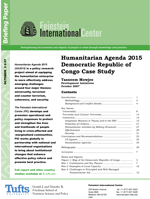The Democratic Republic of the Congo (DRC), formerly Zaire, is the second largest country in Africa and rich in gold, diamonds and minerals in the East of the country. It has been plagued by violent conflict for a decade, though both the Congolese and the West have hopes that elections held in 2006, the first in 40 years, are the first step towards peace and reconstruction. However, the country faces considerable challenges — continuing violence in the East (due to fighting between various armed groups from other countries, mainly Rwanda, and between these armed groups and the Congolese national army), the near absence of healthcare and education facilities in many areas and the lack of roads and other infrastructure. This case study is part of a larger research project undertaken by the Feinstein International Center at Tufts University, titled “Humanitarian Agenda 2015: Principles, Power and Perceptions” (HA2015). The purpose of this study is to examine the relevance of the four issues that, in the coming years, are likely to challenge the resourcefulness and effectiveness of the international community and its humanitarian practitioners. These issues are:
- The extent to which humanitarian values and principles are accepted as universal;
- The implications of terrorism and counter-terrorism for humanitarian action;
- The trend toward coherence between humanitarian and political agendas, particularly as represented by UN integrated missions; and
- The security of humanitarian personnel and the beneficiaries of humanitarian action.
This paper begins with background information on the complex conflicts in the DRC that provides the context for action by the international community. It goes on to outline findings relating to each of the four issues in turn. The analysis focuses mainly on the third of the four identified challenges: in fact, the DRC was selected because it is widely viewed as a successful example of the integration of humanitarian activities into a broader UN peacekeeping mission. While this report examines the particularities of the relationship between MONUC and humanitarian activities in some detail, the discussion illuminates larger questions concerning the structural and operational connections between UN peacekeeping missions and the humanitarian enterprise. The issues of universality and security were also very relevant in this context, while the Global War on Terror was tangential to the DRC experience. The paper concludes with some recommendations for the international community.







